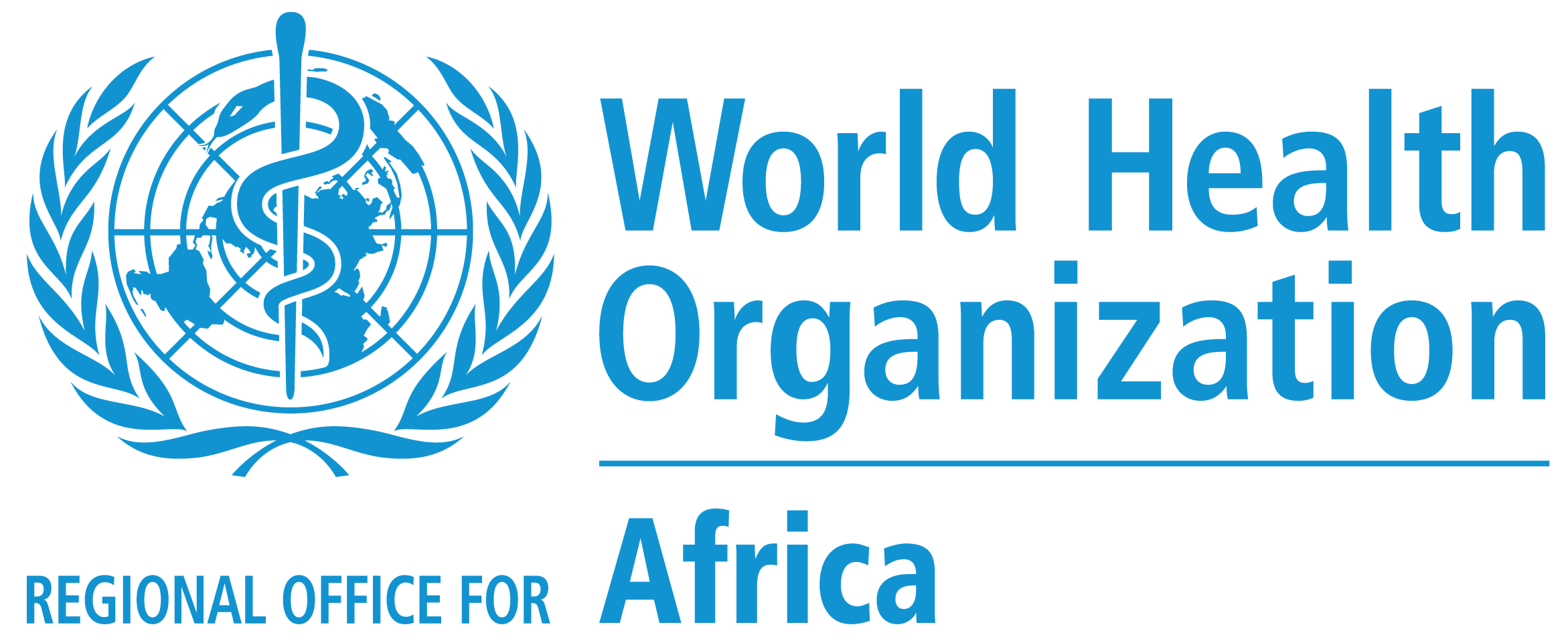AFRICA KICKS
OUT WILD POLIO
1.8 million
wild polio cases averted*
9 billion
oral polio vaccine doses
provided*
220 million
children vaccinated multiple times every year
2 million
volunteer vaccinators support polio campaigns every year
In 1996, the great African leader Nelson Mandela launched the Kick Polio Out of Africa campaign with Rotary International’s support, setting out a vision for a polio-free Africa. At the time, wild polio paralysed 75,000 children each year. To protect communities from this crippling disease, African leaders, health workers, volunteers, parents, global donors and organizations united to reach every child with polio vaccines.
On 25 August 2020, after four years without a single case of wild polio, the African region has been certified free of wild poliovirus. Decades of extraordinary investment has paid off.
Yet, the job is not finished. These efforts must continue to prevent wild polio from returning and to end all forms of polio for good – both in Africa and globally.
WILD POLIO ERADICATION IN AFRICA
EXPLORE THE MAP
All 47 countries in the African region have kicked out wild poliovirus. Hover over each country to see when the last case was reported and when it was declared free of wild poliovirus.
TIMELINE: POLIO ERADICATION IN AFRICA
The Legacy of Polio eradication in Africa
Stopping wild polio in Africa has brought benefits far beyond saving children from paralysis. Africa’s health systems and public health programmes are much stronger because of the investments made in immunization, disease surveillance and outbreak response. Today, a vast network of trained polio staff and community workers help protect millions of children from vaccine-preventable diseases, while responding to health emergencies, like COVID-19. Polio’s legacy must continue to be leveraged and built on in order to achieve other major health goals in the African region.
POLIO STORIES
FACES OF POLIO ERADICATION IN AFRICA
Stopping wild polio in the African region was made possible by the tireless dedication of thousands of frontline heroes, polio survivors and champions who devoted countless hours and travelled thousands of miles, sometimes at great risk, to protect children with the vaccine.
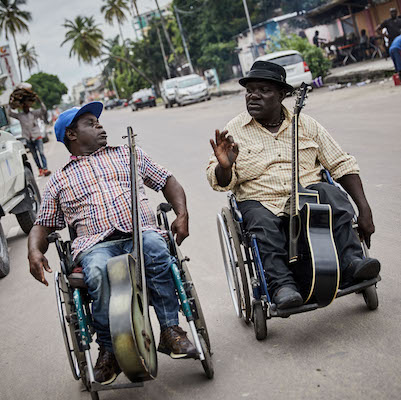
Téo Ntituvuidi and Coco Ngambali
Democratic Republic of the Congo (DRC): Musicians Téo Ntituvuidi and Coco Ngambali, whose band Staff Benda Bilili has reached world acclaim, are both paraplegic polio survivors who were paralysed during childhood. Their song ‘Polio’ has been viewed more than 400,000 times. Through their music and grassroots work with street children and communities, they have been strong advocates for disability and champions for polio eradication.
Ngambali says: “With songs, people feel joy. Everyone is joyful, the lyrics are beautiful, so people are in a good condition to listen, understand your message and follow your advice.”
Kinshasa, 2020 © Hugh Cunningham/WHO
Democratic Republic of Congo: Téo Ntituvuidi and Coco Ngambali
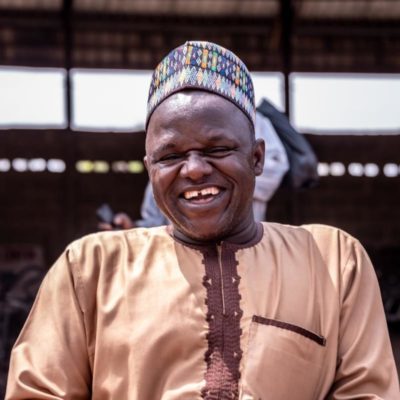
Ayuba Gufwan
Nigeria: Ayuba Gufwan, who was paralysed by polio at age five, was unable to attend school until his uncle built him a hand-pedaled tricycle at age 19. Today, Gufwan is a qualified lawyer, founder of a foundation building tricycles for handicapped people and a champion for polio vaccines.
Gufwan says: “My clear call as a survivor is that we step up the fight to finish polio off. We can’t relax. We need to raise the tempo. I’ve dedicated my life to telling the stories, to working with groups, families and organizations, on the necessity to end polio. And one day, I want to be able to stop making wheelchairs.”
Nigeria, 2019 © WHO
Nigeria: Ayuba Gufwan
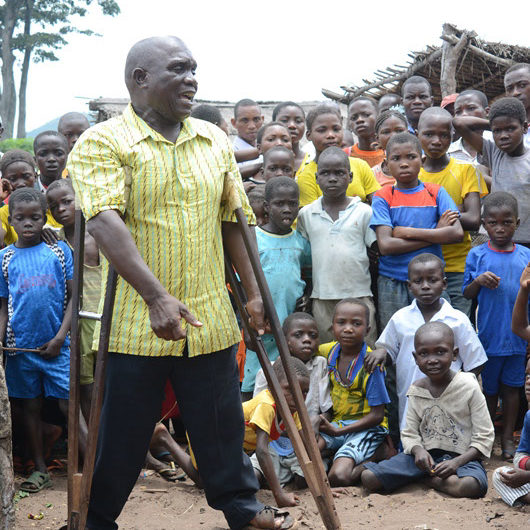
Roger Vuanda Movita
Democratic Republic of the Congo (DRC): Roger Vuanda Movita was two years old when polio took away his ability to walk. Movita — now a successful sports journalist who has endured extensive surgeries in order to walk — has dedicated his life to polio eradication efforts. As a UNICEF ambassador, he has become a powerful voice in the fight against the disease, visiting communities and using his popularity as a journalist to promote vaccination on TV and radio.
Movita says: “I am fighting in the hope that the Democratic Republic of Congo will one day reach [the status of] the other nations where there’s no more talks about this disease that is polio.”
Democratic Republic of Congo: Roger Vuanda Movita
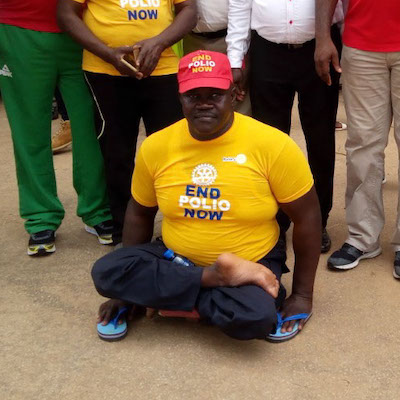
Lawan Didi Misbahu
Nigeria: Lawan Didi Misbahu contracted polio at age three. He discovered a love of football and para-soccer at an early age, and founded the Para-Soccer Federation of Nigeria. Misbahu is also chairman of the Association of Polio Survivors of Nigeria, and has worked to rehabilitate 3,000 paraplegics, who are mostly polio survivors. In 2015, Misbahu was recognized as one of five Heroes of Polio Eradication at a ceremony in Abu Dhabi.
Misbahu says: “Empowering people affected by polio will strengthen our campaign against the disease and help spread the message that vaccinating our children is the only way to prevent them from similar fates.”
Nigeria: Lawan Didi Misbahu
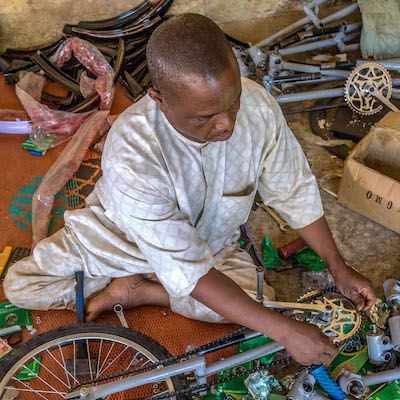
Isaiku Musa Maaji
Nigeria: Isaiku Musa Maaji was paralysed as a child, leaving him with few ways to make a living. Today, he has his own business building hand-operated tricycles to give mobility for adults and children with physical disabilities. Rotary’s Nigeria PolioPlus Committee recently ordered 150 tricycles from Maaji to distribute to polio survivors and others with mobility problems. The relationship Maaji has built with local Rotarians has motivated him to take part in door-to-door polio vaccination campaigns.
Maaji says: “It is not easy to be physically challenged. I go out to educate other people on the importance of polio vaccine because I don’t want any other person to fall victim to polio.”
Nigeria, 2019 © Andrew Esiebo/Rotary International
Nigeria: Isaiku Musa Maaji
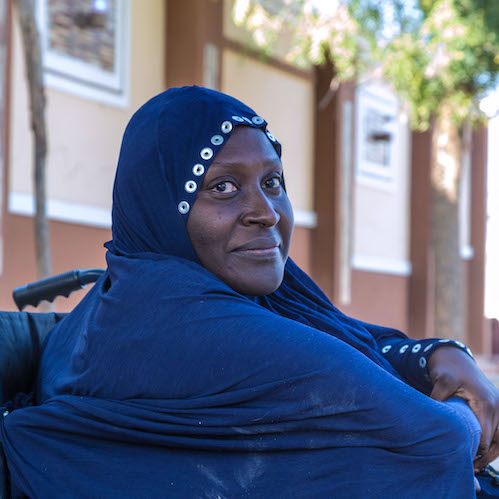
Adama Balla
Nigeria: Adama Balla, who was paralysed by polio when she was 15 months old, is a disability rights activist from Borno state and holds a masters degree in education. As a member of the Polio Survivors Group, she accompanies vaccination teams during door-to-door campaigns to explain to parents the risks of not vaccinating their children.
Adama says: “I am very happy that I am part of wild polio eradication. The next generation will be healthy. No more wheelchairs, no more crutches. It’s about time that people believe that vaccines are safe.”
Nigeria, 2020 © Andrew Esiebo
Nigeria: Adama Balla
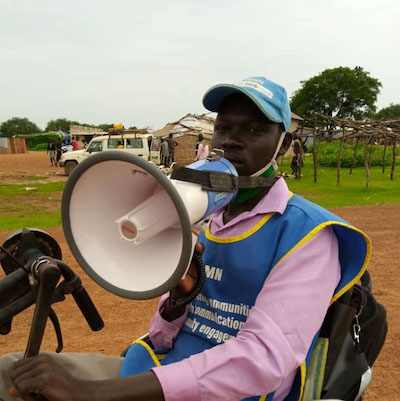
James Giir Thiik
South Sudan: James Giir Thiik, a well-known UNICEF community mobilizer in Warrap state, lost the use of both legs to polio before he turned five years old. Renowned in the area, he travels around eight villages by hand-wheeled tricycle, raising awareness with his megaphone on the importance of immunization.
South Sudan, 2019 ©UNICEF South Sudan/Deng
South Sudan: James Giir Thiik
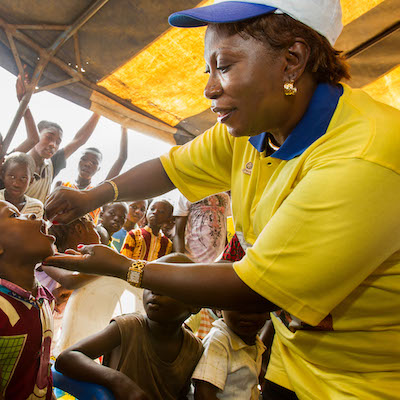
Marie-Irène Richmond-Ahoua
Côte d’Ivoire: Marie-Irène Richmond-Ahoua is a member of the Rotary Club of Abidjan-Bietry, Côte d’Ivoire, and a known polio champion in her home country. She has led countless polio immunization campaigns in West Africa, and in 2011, helped organize a campaign in Côte d’Ivoire during a military coup.
Marie-Irène says: “We truly believe in what we are doing. In this war against polio, we are an army of volunteers and these two small drops are our weapon. All conditions to win this fight are practically met: an effective vaccine, a proven door-to-door strategy, a good level of monitoring, human and financial resources.”
Messikro, Cote d’Ivoire, 2013 © Rotary International
Côte d’Ivoire: Marie-Irène Richmond-Ahoua

Adama Traoré
Mali: Adama Traoré has worked as a vaccinator in the community health centre in his village of Sadiola in western Mali for more than 10 years. Traoré, who became a vaccinator after a neighbor’s son died of measles, travels up to 100 kilometers a day to surrounding communities on his motorcycle equipped with a cooler box of vaccines, including for polio.
Traoré says: “Before I leave, I make sure that everything is well attached and I check one last time that I’ve packed all of the basic vaccines which I might need, because each vaccine can save a child’s life.”
Mali: Adama Traoré
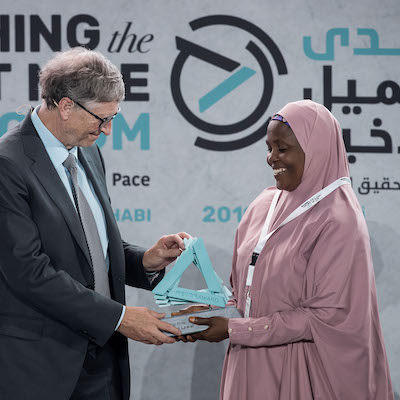
Rahane Lawal
Nigeria: Rahane Lawal, a mother of 10 children in Kaduna state, is a UNICEF volunteer who speaks with parents in Nigeria about the importance of vaccination. In 2019, she received a REACH Award at the Reaching the Last Mile Forum in Abu Dhabi in recognition of her bravery for keeping her community safe from polio after she was kidnapped for ransom and witnessed her father’s murder.
Lawal says: “Life has been difficult after what I went through, but I will not allow what happened to deter me from the work I am doing. I am ready to do what I can to make my community free from childhood killer diseases.”
Nigeria: Rahane Lawal
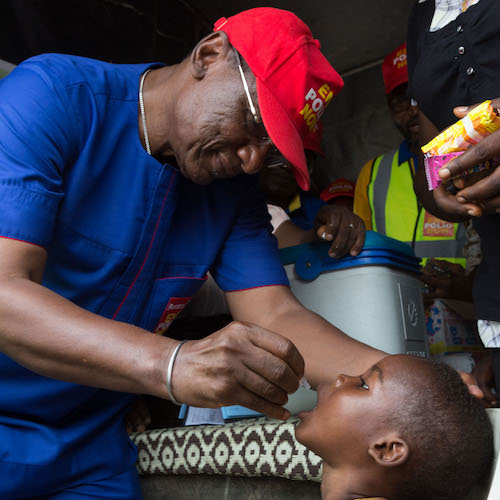
Tunji Funsho
Nigeria: Dr. Tunji Funsho is a cardiologist, Rotary member, and chair of Rotary’s National PolioPlus Committee for Nigeria. He works with Rotary and its GPEI partners to support polio survivors and develop innovative solutions to help eradicate polio in Nigeria.
Dr. Funsho says: “We must ensure that funding continues until the end, and that funders don’t take their eyes off the ball as far as primary health care is concerned – in particular, routine immunization. The key to the endgame strategy is to ensure that routine immunization continues.”
Lagos, Nigeria, 2017 © Rotary International
Nigeria: Tunji Funsho
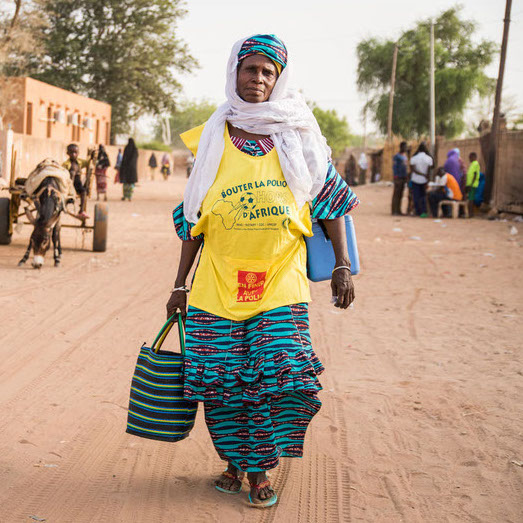
Hawa Amadou
Niger: Hawa Amadou is 70 years old and has been a community health worker ever since the district health centre was created in Dosso region 30 years ago. She regularly conducts door-to-door visits to provide polio vaccines.
Hawa says: “I undertake social mobilization activities for malaria, tuberculosis, malnutrition and polio. I enjoy my work because I want to help my community. I trust them and they trust me.”
Dosso, Niger, 2017 © Bill & Melinda Gates Foundation
Niger: Hawa Amadou
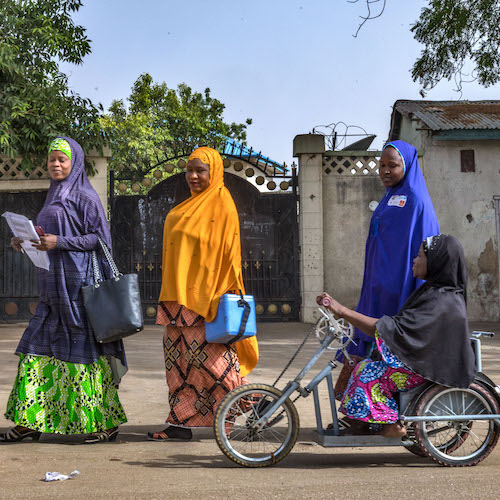
Falmata Mustapha
Nigeria: As a polio survivor, Falmata Mustapha raises awareness among parents in her community of the importance of vaccination and takes part in door-to-door vaccination campaigns. She rides a hand-operated tricycle donated to her by Rotary’s Nigeria PolioPlus Committee.
Mustapha says: “Since working with the team, I have seen an increase in immunization compliance in the community. I am well-regarded in the community because of my work, and I am happy about this.”
Nigeria, 2019 © Andrew Esiebo/Rotary International
Nigeria: Falmata Mustapha

Angélique Kidjo
Benin: Grammy award winner Angélique Kidjo has been a dedicated Rotary ambassador and UNICEF goodwill ambassador for over 10 years. She lends her voice to numerous polio campaigns and recently released an updated version of her 2014 song ‘Eva’, dedicated to Rotary’s work.
Angélique says: “I am from a generation who has witnessed the devastating effects of polio. When I discovered how close we were from eradicating polio, I was very motivated to be a part of this movement.”
New York, United States, 2015 © Rotary International
Benin: Angélique Kidjo
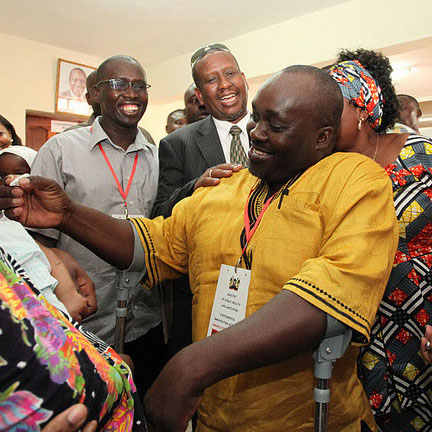
Harold Kipchumba
Kenya: Senator Harold Kipchumba, who was crippled by polio when he was four years old, has used his political career to fight against discrimination and support polio immunization efforts. In 2013, after a polio outbreak in East Africa, he advocated strongly for polio immunization across the region, and in 2015 became a United Nations Immunization ambassador.
Harold says: “I am driven by the desire to serve, make another person’s situation better but also to speak for their rights.”
Kenya, 2013 © UNICEF ESARO
Kenya: Harold Kipchumba
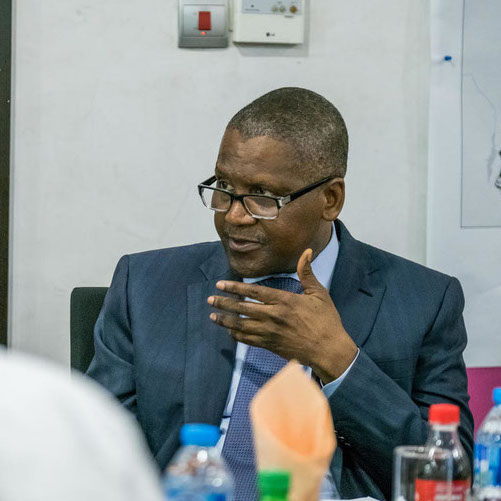
Alhaji Aliko Dangote
Nigeria: Business leader and philanthropist Alhaji Aliko Dangote, President & Chief Executive of Dangote Industries Limited and Chairman of the Aliko Dangote Foundation, has played a key role in boosting Africa’s polio eradication efforts. He has organized partnerships with northern states in Nigeria and Chad with the Bill & Melinda Gates Foundation to promote routine immunization, polio eradication and public health systems strengthening.
Dangote says: “Vaccination is one of the best investments a country can make. Provided adequate funding, solid infrastructure, and genuine commitment from the country’s leaders, every child in Nigeria could be immunized against a range of diseases.”
Nigeria, 2018 © Bill & Melinda Gates Foundation
Nigeria: Alhaji Aliko Dangote
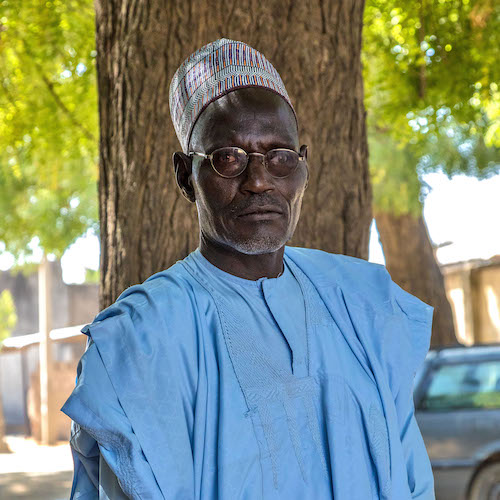
Adamu Musa
Nigeria: Adamu Musa, 68 years old, lost his son Zakaria, a polio community volunteer while he was working with the polio programme to immunize children in inaccessible areas. Zakaria, who was in his early 20s, had just finished his school education and died weeks before he got married.
Musa says: “My son Zakaria always wanted to do something meaningful. I am not happy that he died but at least the job he died for is now completed.”
Nigeria, 2020 © Andrew Esiebo/WHO
Nigeria: Adamu Musa
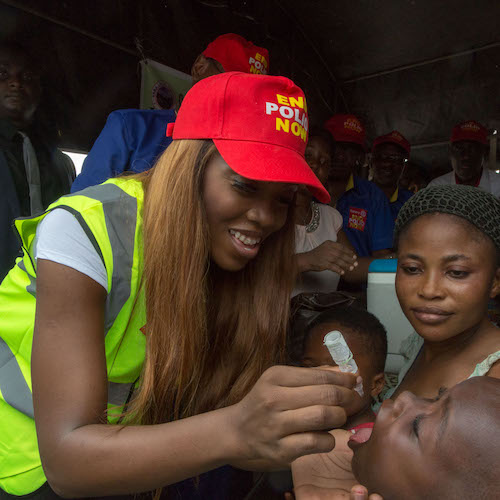
Tiwa Savage
Nigeria: Singer-songwriter Tiwa Savage became a Rotary celebrity ambassador for polio eradication in 2017, during a critical juncture in her home country’s polio eradication efforts. The well-known artist joined national immunization campaigns in response to Nigeria’s polio outbreak in 2016, which happened two years after the country’s last case of wild polio.
Savage says: “This is a cause that hits close to home for me, not only as a mother of a small child, but as a proud Nigerian, whose country has been battling this disease for many years.”
Nigeria: Tiwa Savage
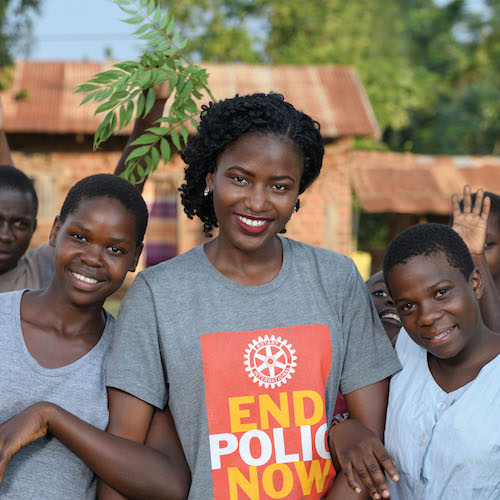
Patience Asiimwe
Uganda: Patience Asiimwe became a Rotaract member with Rotary International after her mother encouraged her to pursue her desire to help people. In 2018, she travelled in her native Uganda with a polio vaccination team as part of Rotary’s virtual reality film, Two Drops of Patience.
Asiimwe says: “I remember thinking, this is what it takes to eradicate polio: people of action, the support of partners, health workers, and of course those two little drops. [The vaccine] is something so small, yet it can do so much.”
Uganda, 2018 © Rotary International
Uganda: Patience Asiimwe
PILLARS OF POLIO ERADICATION
Eradicating all forms of polio in the African region requires a combination of strategies, adapted to the continent’s challenges of distance, migration and insecurity.
